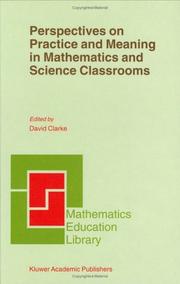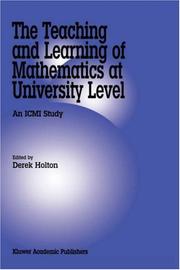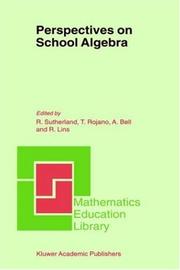| Listing 1 - 4 of 4 |
Sort by
|
Book
ISBN: 2876940914 Year: 2001 Publisher: Paris : Editions du Kangourou,
Abstract | Keywords | Export | Availability | Bookmark
 Loading...
Loading...Choose an application
- Reference Manager
- EndNote
- RefWorks (Direct export to RefWorks)
Games in mathematics education. --- Mathematical recreations. --- Jeux mathématiques. --- Jeux mathématiques.

ISBN: 1280207760 9786610207763 0306472287 0792369386 Year: 2001 Publisher: Dordrecht, Netherlands ; Boston, Massachusetts : Kluwer Academic,
Abstract | Keywords | Export | Availability | Bookmark
 Loading...
Loading...Choose an application
- Reference Manager
- EndNote
- RefWorks (Direct export to RefWorks)
A team of researchers centred at the University of Melbourne, each with particular areas of expertise, contributed their analyses of a shared collection of videotape, interview, and documentary data. The result is a variegated picture of science and mathematics classrooms that challenges a research tradition that converges on the truth. In this book, we surround you with different images of the classroom. It is hoped that some will address issues of interest, some will confirm beliefs you have long held, some will challenge these same beliefs, and some may surprise you. The resulting account should appeal to educational researchers, research students, and practitioners with an interest in optimising the effectiveness of classrooms as environments for learning.
Mathematics --- Science --- Study and teaching. --- Mathematics. --- Mathematics Education. --- Science Education. --- Learning & Instruction. --- Mathematics—Study and teaching . --- Science education. --- Learning. --- Instruction. --- Learning process --- Comprehension --- Education --- Science education --- Scientific education

ISBN: 0792371917 9786610207794 1280207795 0306472317 1402000723 Year: 2001 Publisher: Dordrecht Kluwer
Abstract | Keywords | Export | Availability | Bookmark
 Loading...
Loading...Choose an application
- Reference Manager
- EndNote
- RefWorks (Direct export to RefWorks)
This book is the final report of the ICMI study on the Teaching and Learning of Mathematics at University Level. As such it is one of a number of such studies that ICMI has commissioned. The other Study Volumes cover assessment in mathematics education, gender equity, research in mathematics education, the teaching of geometry, and history in mathematics education. All ofthese Study Volumes represent a statement of the state of the art in their respective areas. We hope that this is also the case for the current Study Volume. The current study on university level mathematics was commissioned for essentially four reasons. First, universities world-wide are accepting a much larger and more diverse group of students than has been the case. Consequently, universities have begun to adopt a role more like that of the school system and less like the elite institutions of the past. As a result the educational and pedagogical issues facing universities have changed. Second, although university student numbers have increased significantly, there has not been a corresponding increase in the number of mathematics majors. Hence mathematics departments have to be more aware of their students’ needs in order to retain the students they have and to attract future students. As part of this awareness, departments of mathematics have to take the teaching and learning of mathematics more seriously than perhaps they have in the past.
Mathematics --- Education, Higher --- Study and teaching (Higher) --- Mathematics. --- Study and teaching (Higher). --- Didactics of mathematics --- Matrix theory. --- Global analysis (Mathematics). --- Mathematics Education. --- Learning & Instruction. --- Mathematics, general. --- Linear and Multilinear Algebras, Matrix Theory. --- Analysis. --- Mathematical Modeling and Industrial Mathematics. --- Mathematics—Study and teaching . --- Learning. --- Instruction. --- Algebra. --- Mathematical analysis. --- Analysis (Mathematics). --- Mathematical models. --- Models, Mathematical --- Simulation methods --- 517.1 Mathematical analysis --- Mathematical analysis --- Math --- Science --- Learning process --- Comprehension --- Education

ISBN: 9780792364627 0792364627 9780306472237 9780306472236 9786610207718 128020771X 0306472236 Year: 2001 Publisher: Dordrecht Kluwer Academic Publishers
Abstract | Keywords | Export | Availability | Bookmark
 Loading...
Loading...Choose an application
- Reference Manager
- EndNote
- RefWorks (Direct export to RefWorks)
This book confronts the issue of how young people can find a way into the world of algebra. The contributions represent multiple perspectives which include an analysis of situations in which algebra is an efficient problem-solving tool, the use of computer-based technologies, and a consideration of the historical evolution of algebra. The book emphasises the situated nature of algebraic activity as opposed to being concerned with identifying students' conceptions in isolation from problem-solving activity. The chapters emerged from a working group of the International Group for the Psychology of Mathematics Education. The authors are drawn from an international community and the work highlights the differences in school algebra around the world. The group invited Nicolas Balacheff to write a provocative postscript and he suggests that `there is no possible entrance to the world of algebra without a strong push or guidance from the teacher, because there is no natural passage from the problématique accessible from the child's world to the mathematical problématique'.
Algebra --- Algèbre --- Study and teaching. --- Etude et enseignement --- 512 --- 51:37 --- Mathematics-:-Opvoeding en onderwijs --(algemeen) --- 51:37 Mathematics-:-Opvoeding en onderwijs --(algemeen) --- 512 Algebra --- Study and teaching --- Mathematics. --- Artificial intelligence. --- Mathematics Education. --- Learning & Instruction. --- Artificial Intelligence. --- History of Mathematical Sciences. --- Mathematics—Study and teaching . --- Learning. --- Instruction. --- History. --- Annals --- Auxiliary sciences of history --- Math --- Science --- AI (Artificial intelligence) --- Artificial thinking --- Electronic brains --- Intellectronics --- Intelligence, Artificial --- Intelligent machines --- Machine intelligence --- Thinking, Artificial --- Bionics --- Cognitive science --- Digital computer simulation --- Electronic data processing --- Logic machines --- Machine theory --- Self-organizing systems --- Simulation methods --- Fifth generation computers --- Neural computers --- Learning process --- Comprehension --- Education
| Listing 1 - 4 of 4 |
Sort by
|

 Search
Search Feedback
Feedback About UniCat
About UniCat  Help
Help News
News